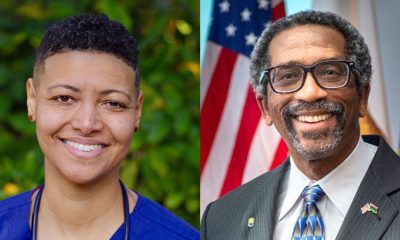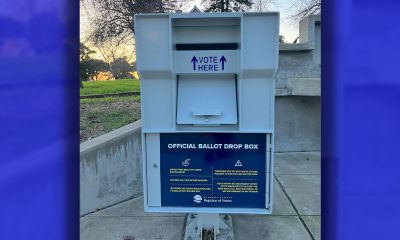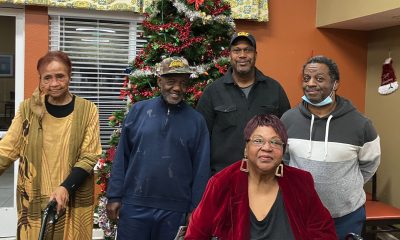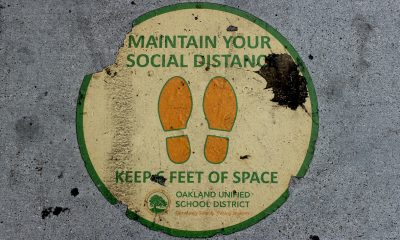Bay Area
Remembering Housing Activist Lillian Love
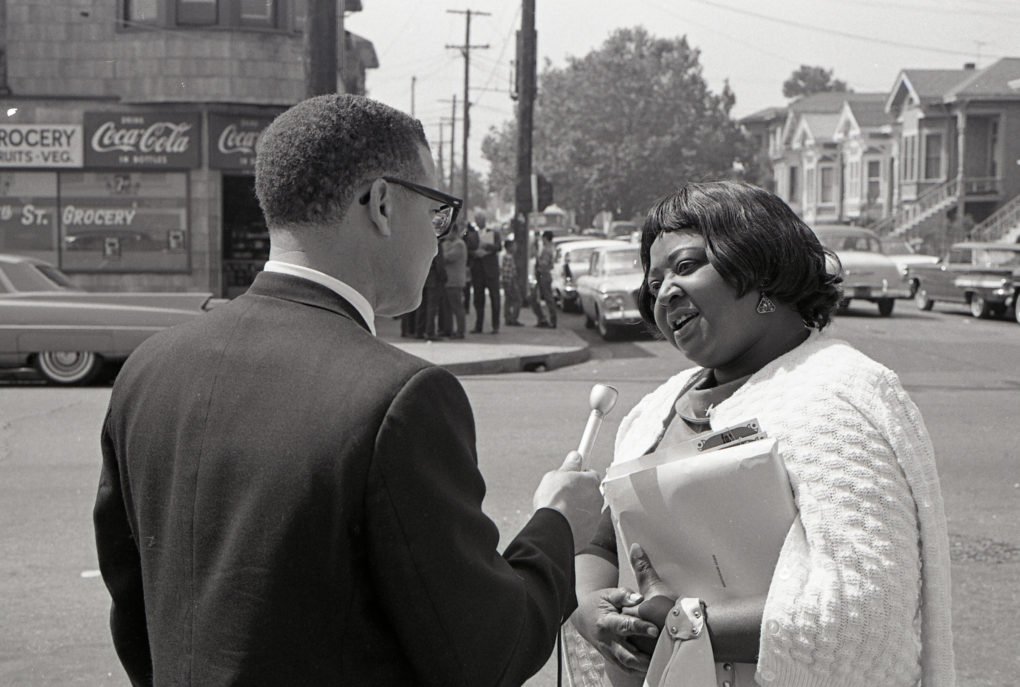
If you take a stroll through West Oakland along 10th Street, the differences you will notice looking south into the Acorn neighborhood, and looking north into the Oak Center neighborhood are striking.
Acorn’s housing is high density and mostly small homes that look similar to one another. Oak Center’s housing is colorful with high ceilings, different from home to home, and intricate in design.
The reason for the differences? The City of Oakland allowed developers to demolish almost the entire Acorn neighborhood in 1962 to execute the first phase of The General Urban Renewal Plan (GURP). As the city geared up to execute the second phase of the plan, which would have originally meant the almost total destruction of homes in Oak Center, many of which were constructed early in the 20th century, it was met with stubborn organized opposition that changed the city’s plans.
The leader of this opposition was a Black woman named Lillian Q Love, and the old Victorian homes in Oak Center were mostly rehabilitated instead of demolished.
“There is no discussion about West Oakland and its history without the name Lillian Love. There has never been a person who has been more influential in preserving the neighborhood and character of Oak Center,” said Henry Gardner, who moved to Oakland in 1971 and has previously served as Oakland’s city manager.
Love felt that homes in West Oakland needed aid, but was against the manner in which the city worked with Acorn, simply demolishing homes there instead of working to fix them. While a World War II and post-WWII migration caused the Black population of Oakland to quintuple between 1940 and 1950, discriminatory lending practices and racist zoning laws confined Blacks during that time mostly to West Oakland. But the population was far too large for the housing available, and the overcrowding was a cause for many of the area’s old homes to fall into disrepair.
“The City did more to destroy West Oakland than anyone else,” said Gardner, of the time.
Born in Texas on April 3, 1912, Love moved to Oakland as a child, and graduated from The University of California, Berkeley, probably at some point in the 1930s. She claims her organizing was inspired by her father, William E. Meneweather, who unsuccessfully fought the city over constructing public housing that displaced his family in 1938.
In 1963, Love formed The Oak Center Neighborhood Association (OCNA), an organization that pushed the city to provide housing rehabilitation funding in place of destruction and redevelopment. The OCNA then accused Thomas Bell, the first director of The Oakland Redevelopment Agency (ORA), of purposely misleading the public on GURP. Bell faced pressure to resign by the federal Urban Renewal Administration and did so in 1964, but there’s evidence that pressure from the OCNA also caused Bell’s resignation.
“He said he was with us for preservation but in his actions he was for clearance,” said Constantine Lekas, the OCNA’s original vice president, in a 1981 interview. In the same interview, Lekas claims that OCNA was able to get Bell fired, and describes his leaving the position as “a turning point.”
While Love worked almost entirely with other Black people, it’s noteworthy that some of her organizing crossed racial lines. Lekas was an immigrant from Greece.
After Bell resigned, John B. Williams became the ORA’s new director. In 1966, Love was named a commissioner for the ORA. Williams also allotted a grant to the OCNA in 1966 in the amount of $15 million for housing rehabilitation, which is about $120 million in today’s dollars when adjusted for inflation.
Williams enforced minority training and hiring policies, which required the ORA to hire and award contracts to far more non-white people than they had previously.
Love died on Feb.21, 1987, at the age of 74. Henry Gardner, who saw her speak regularly at City Hall and admired her, said she kept up her housing activism long after the Oak Center fight had ended.
“She understood the issues upside-down. And she was active until her last breath,” said Gardner.
The Oakland Post thanks Moriah Ulinskas, who provided biographical information for this article that will soon be added to the biography cards in the Oakland History Room at The Oakland Library.
Activism
Oakland Post: Week of April 24 – 30, 2024
The printed Weekly Edition of the Oakland Post: Week of April 24 – 30, 2024

To enlarge your view of this issue, use the slider, magnifying glass icon or full page icon in the lower right corner of the browser window. ![]()
Alameda County
DA Pamela Price Stands by Mom Who Lost Son to Gun Violence in Oakland
Last week, The Post published a photo showing Alameda County District Attorney Pamela Price with Carol Jones, whose son, Patrick DeMarco Scott, was gunned down by an unknown assailant in 2018.

Publisher’s note: Last week, The Post published a photo showing Alameda County District Attorney Pamela Price with Carol Jones, whose son, Patrick DeMarco Scott, was gunned down by an unknown assailant in 2018. The photo was too small for readers to see where the women were and what they were doing. Here we show Price and Jones as they complete a walk in memory of Scott. For more information and to contribute, please contact Carol Jones at 510-978-5517 at morefoundation.help@gmail.com. Courtesy photo.
Bay Area
State Controller Malia Cohen Keynote Speaker at S.F. Wealth Conference
California State Controller Malia Cohen delivered the keynote speech to over 50 business women at the Black Wealth Brunch held on March 28 at the War Memorial and Performing Arts Center at 301 Van Ness Ave. in San Francisco. The Enterprising Women Networking SF Chapter of the American Business Women’s Association (ABWA) hosted the Green Room event to launch its platform designed to close the racial wealth gap in Black and Brown communities.

By Carla Thomas
California State Controller Malia Cohen delivered the keynote speech to over 50 business women at the Black Wealth Brunch held on March 28 at the War Memorial and Performing Arts Center at 301 Van Ness Ave. in San Francisco.
The Enterprising Women Networking SF Chapter of the American Business Women’s Association (ABWA) hosted the Green Room event to launch its platform designed to close the racial wealth gap in Black and Brown communities.
“Our goal is to educate Black and Brown families in the masses about financial wellness, wealth building, and how to protect and preserve wealth,” said ABWA San Francisco Chapter President LaRonda Smith.
ABWA’s mission is to bring together businesswomen of diverse occupations and provide opportunities for them to help themselves and others grow personally and professionally through leadership, education, networking support, and national recognition.
“This day is about recognizing influential women, hearing from an accomplished woman as our keynote speaker and allowing women to come together as powerful people,” said ABWA SF Chapter Vice President Velma Landers.
More than 60 attendees dined on the culinary delights of Chef Sharon Lee of The Spot catering, which included a full soul food brunch of skewered shrimp, chicken, blackened salmon, and mac and cheese.
Cohen discussed the many economic disparities women and people of color face. From pay equity to financial literacy, Cohen shared not only statistics, but was excited about a new solution in motion which entailed partnering with Californians for Financial Education.
“I want everyone to reach their full potential,” she said. “Just a few weeks ago in Sacramento, I partnered with an organization, Californians for Financial Education.
“We gathered 990 signatures and submitted it to the [California] Secretary of State to get an initiative on the ballot that guarantees personal finance courses for every public school kid in the state of California.
“Every California student deserves an equal opportunity to learn about filing taxes, interest rates, budgets, and understanding the impact of credit scores. The way we begin to do that is to teach it,” Cohen said.
By equipping students with information, Cohen hopes to close the financial wealth gap, and give everyone an opportunity to reach their full financial potential. “They have to first be equipped with the information and education is the key. Then all we need are opportunities to step into spaces and places of power.”
Cohen went on to share that in her own upbringing, she was not guided on financial principles that could jump start her finances. “Communities of color don’t have the same information and I don’t know about you, but I did not grow up listening to my parents discussing their assets, their investments, and diversifying their portfolio. This is the kind of nomenclature and language we are trying to introduce to our future generations so we can pivot from a life of poverty so we can pivot away and never return to poverty.”
Cohen urged audience members to pass the initiative on the November 2024 ballot.
“When we come together as women, uplift women, and support women, we all win. By networking and learning together, we can continue to build generational wealth,” said Landers. “Passing a powerful initiative will ensure the next generation of California students will be empowered to make more informed financial decisions, decisions that will last them a lifetime.”
-

 Community2 weeks ago
Community2 weeks agoFinancial Assistance Bill for Descendants of Enslaved Persons to Help Them Purchase, Own, or Maintain a Home
-

 Activism3 weeks ago
Activism3 weeks agoOakland Post: Week of April 3 – 6, 2024
-

 Business2 weeks ago
Business2 weeks agoV.P. Kamala Harris: Americans With Criminal Records Will Soon Be Eligible for SBA Loans
-

 Activism2 weeks ago
Activism2 weeks agoOakland Post: Week of April 10 – 16, 2024
-

 Community2 weeks ago
Community2 weeks agoAG Bonta Says Oakland School Leaders Should Comply with State Laws to Avoid ‘Disparate Harm’ When Closing or Merging Schools
-

 Community1 week ago
Community1 week agoOakland WNBA Player to be Inducted Into Hall of Fame
-

 Community1 week ago
Community1 week agoRichmond Nonprofit Helps Ex-Felons Get Back on Their Feet
-

 Community2 weeks ago
Community2 weeks agoThe Year Ahead: Assembly Speaker Rivas Discusses Priorities, Problems


